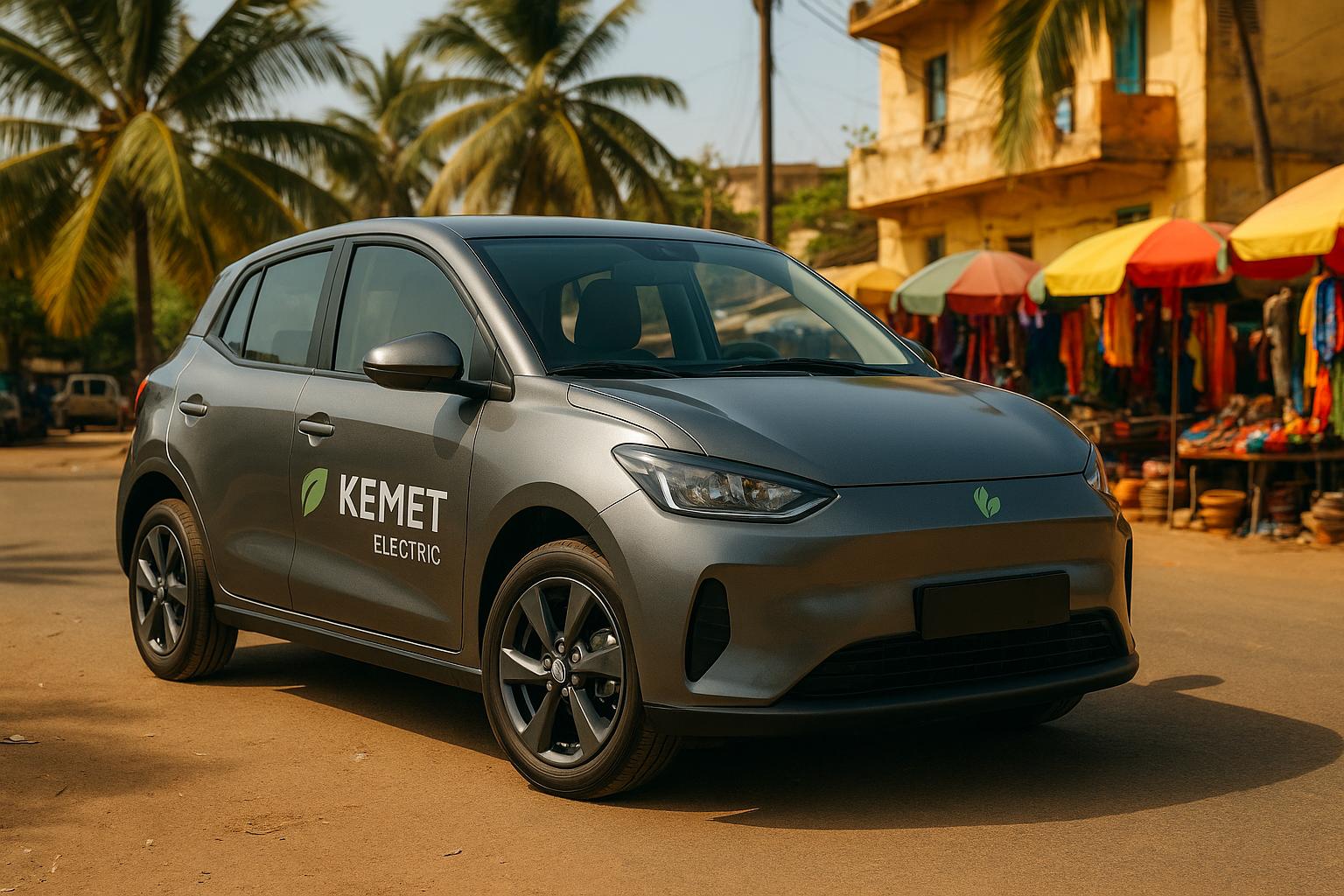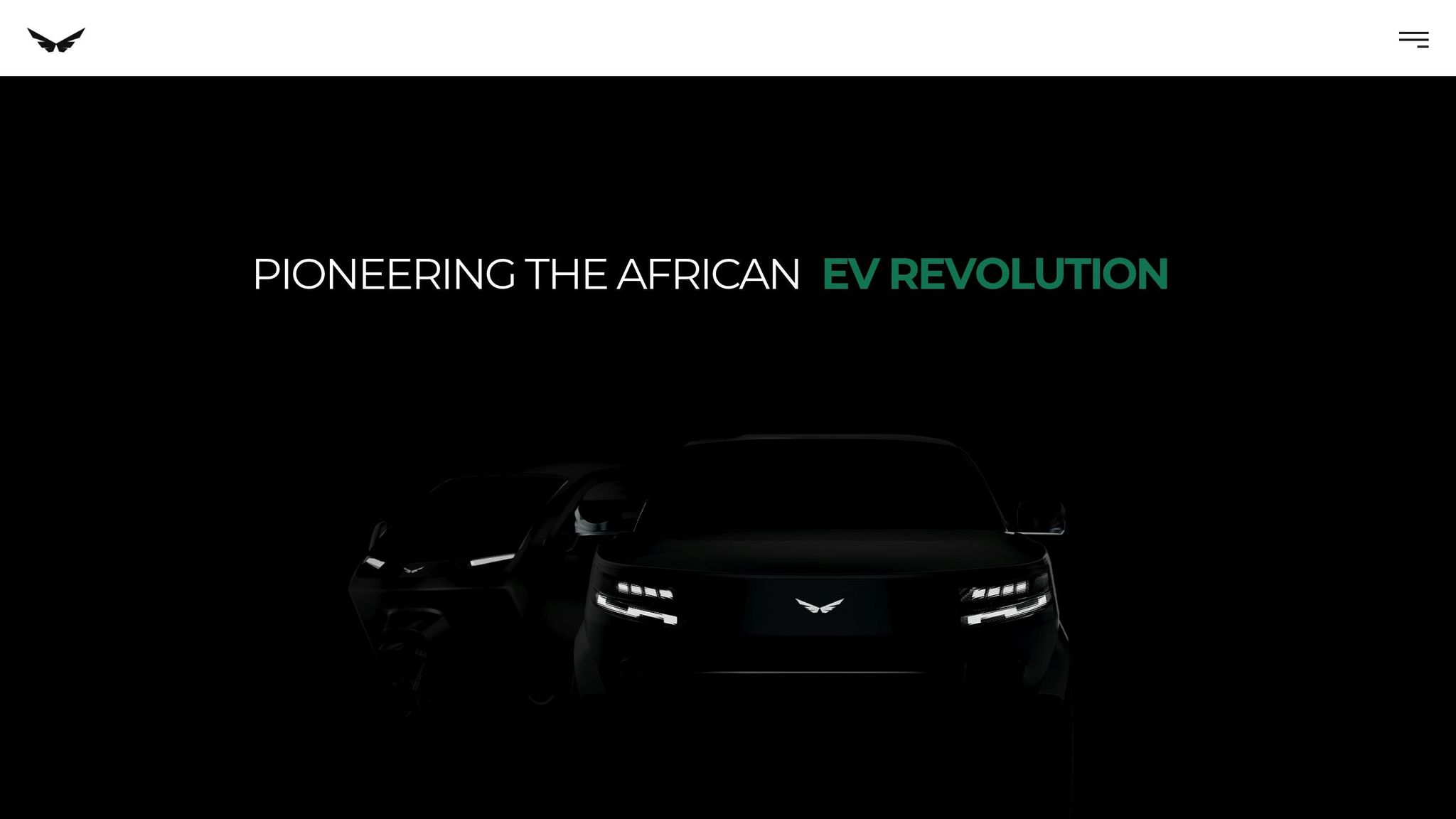
Kemet Automotive Senegal is transforming transportation in West Africa by producing electric vehicles tailored to local needs. Here’s what you need to know:
- Purpose: Kemet designs electric vehicles to handle local road conditions and reduce reliance on imports.
- Models: Three options are available:
- Gezo Tricycle: Affordable, short-distance travel.
- Nandi Compact SUV: Versatile for urban and rural areas.
- Mansa SUV: High-performance for tough terrains.
- Production: Vehicles are made locally, using regional materials and skilled workers.
- Impact: The company creates jobs, lowers costs by avoiding import tariffs, and supports cleaner transportation.
- Challenges: Limited infrastructure and funding, but Kemet addresses these with region-specific solutions.
Kemet is also expanding EV infrastructure and offers vehicles online through EV24.africa, making clean transportation more accessible across Africa.
Kemet Automotive Senegal: Company Vision, Manufacturing Operations, and Local Impact

Company Vision and Leadership Team
Kemet is reshaping local transportation by creating electric vehicles specifically designed to meet regional needs. Their mission is clear: to develop mobility solutions that are sustainable while reducing dependence on imported vehicles. The leadership team brings together deep automotive expertise and a strong understanding of local market dynamics. Their focus is on crafting vehicles that align with the region’s infrastructure and environmental conditions. Beyond manufacturing, Kemet is working to boost industrial development by building a network of local suppliers, skilled technicians, and support services.
Manufacturing Process and Local Production Methods
Kemet Automotive Senegal emphasizes local integration by sourcing high-quality materials from the region and collaborating with local organizations. They invest heavily in training local workers, ensuring they are skilled in precise assembly techniques and rigorous quality control measures. By adhering to international standards while addressing local needs, Kemet ensures their production processes deliver reliable vehicles. This approach allows them to respond swiftly to changing market demands and tackle economic and infrastructural hurdles effectively.
Socioeconomic Challenges and Market Opportunities
Kemet operates in a landscape where infrastructure and funding pose notable challenges. However, these obstacles also create room for innovative, region-specific solutions. By focusing on technology tailored to local conditions and adopting environmentally conscious practices, Kemet is driving job creation, supporting economic growth, and promoting cleaner transportation. Their efforts reflect a broader commitment to providing mobility solutions that address both economic realities and environmental concerns in the region.
Key Features of Kemet’s Electric Vehicles
Vehicle Models Designed for Local Conditions
Kemet has developed three vehicle models, each thoughtfully crafted to meet specific local needs. The Gezo tricycle is ideal for affordable, short-distance travel. The Nandi compact SUV offers flexibility for both city streets and rural paths. For those seeking top-tier performance in challenging environments, the Mansa SUV delivers premium capabilities.
"Our models are built with Africans’ road in mind." – Kemet Automotive
By focusing on these models, Kemet combines practicality with advanced technology to tackle safety and performance challenges head-on.
Technology and Safety Features
Kemet’s vehicles are equipped with smart systems designed for local terrains. Features like higher ground clearance, reinforced suspension, and intelligent power management ensure stability and safety on uneven roads. Additionally, their adaptive power systems are built to handle fluctuations in the local power grid, guaranteeing dependable performance even when infrastructure is inconsistent.
Co-founder and Co-CEO Nissi Ogulu highlights this commitment:
"We are creating products that will work better for the drivability in the terrain that we exist in."
Technical Specifications and Performance Data
Every Kemet vehicle undergoes rigorous testing to ensure it can handle real-world conditions. From bustling city commutes to remote rural journeys, these vehicles are designed to deliver efficiency, power, and reliable charging. Their performance validation under local conditions confirms their readiness to meet the unique demands of the region.
Bientôt la première voiture électrique made in Sénégal
sbb-itb-99e19e3
Economic and Environmental Impact of Local EV Manufacturing
Kemet’s focus on local production methods doesn’t just redefine how vehicles are made – it also delivers meaningful economic and environmental advantages.
Boosting Local Economies and Creating Jobs
Kemet’s operations are a major driver of economic activity. The company employs a variety of skilled professionals, from technicians and engineers to assembly workers, directly at its production facilities. But the ripple effects go far beyond these direct jobs. Local suppliers, parts manufacturers, and service providers all benefit from the increased demand generated by Kemet’s presence.
By establishing regional training programs, Kemet equips the local workforce with the skills needed to support Senegal’s growing automotive sector. This approach encourages related industries to establish themselves nearby, creating a cluster effect that strengthens Senegal’s position as a key manufacturing hub in West Africa.
Kemet’s investments in infrastructure, such as advanced production equipment and training centers, underscore its long-term commitment to the Senegalese economy. These efforts don’t just create jobs – they lay the groundwork for sustained economic growth and a more resilient local industry.
Cutting Costs and Eliminating Import Tariffs
Producing electric vehicles domestically offers clear cost advantages over importing them. By manufacturing locally, Kemet avoids hefty import duties, reduces shipping and logistics expenses, and eliminates the need for ocean freight, insurance, and port fees. These savings translate into lower prices for consumers.
In addition, Kemet leverages lower labor costs without compromising on quality, enabling it to price its vehicles competitively and reach a wider audience. Producing locally also shields the company from the unpredictability of exchange rate fluctuations, making costs more stable and planning more reliable. While these financial benefits are significant, the environmental advantages of local production are equally compelling.
Reducing Environmental Impact and Supporting Climate Goals
Kemet’s electric vehicles bring a cleaner, greener alternative to urban transportation. By producing zero direct emissions, these vehicles improve air quality in cities. Meanwhile, local manufacturing reduces the carbon footprint associated with shipping vehicles across the globe, aligning with Senegal’s national climate initiatives.
Senegal has pledged to cut greenhouse gas emissions as part of its commitments under the Paris Climate Agreement. Kemet’s electric vehicles play a critical role in this effort by replacing traditional internal combustion engine vehicles with cleaner alternatives.
The company also adopts sustainable practices in its production processes, such as sourcing materials locally whenever possible and using energy-efficient methods. These measures further reduce the environmental impact of manufacturing. Additionally, as Senegal expands its renewable energy capacity, the benefits of electric vehicles grow. Charging EVs with clean energy creates a positive feedback loop, amplifying the environmental gains of transitioning to electric transportation.
Supporting Clean Transportation: Infrastructure, Partnerships, and Market Access
Kemet isn’t just focused on producing electric vehicles – it’s also building the necessary support system to ensure clean transportation thrives in the region. By combining infrastructure development with strategic distribution channels, Kemet is creating an ecosystem that brings its vision for sustainable mobility to life.
Charging Infrastructure Development
To encourage the adoption of electric vehicles in Senegal and neighboring areas, Kemet Automotive is working on expanding charging infrastructure. These efforts aim to make EV ownership more practical and accessible, addressing one of the biggest challenges for electric vehicle users.
Online Marketplace Access and Distribution
Through EV24.africa, Kemet provides a comprehensive online platform where customers can explore and purchase its electric vehicles. The site offers detailed product descriptions, transparent pricing, and financing options, making the buying process straightforward. With delivery available in 54 African countries and a review system to guide decisions, the platform bridges geographic gaps and empowers customers to make informed choices.
Conclusion: Kemet’s Role in Africa’s Clean Transportation Future
Kemet Automotive Senegal plays a key part in shaping Africa’s clean transportation landscape. By focusing on local manufacturing, the company not only reduces the need for imported electric vehicles but also supports the continent’s shift toward cleaner energy solutions.
This local approach creates jobs, lowers costs, and builds valuable technical skills within the region. It also provides African nations with an opportunity to establish their own clean-technology industries, reducing dependence on foreign manufacturers.
Kemet’s commitment to designing vehicles suited for local conditions – factoring in terrain, climate, and economic realities – ensures their solutions address the specific needs of consumers and businesses in the region.
This localized production model also brings environmental benefits. Manufacturing closer to home reduces shipping-related emissions, while the adoption of electric vehicles further cuts overall emissions. Kemet’s holistic strategy, which includes building vehicles, developing charging infrastructure, and offering accessible distribution through the EV24.africa platform, strengthens the foundation for a more sustainable transportation system.
The company’s progress could inspire similar initiatives across Africa. If locally made electric vehicles gain traction in West Africa, they could pave the way for broader efforts toward sustainable mobility across the continent.
Kemet Automotive Senegal is driving forward both local vehicle production and the future of clean transportation in Africa.
FAQs
How is Kemet Automotive Senegal overcoming challenges like limited infrastructure and funding for electric vehicles in West Africa?
Kemet Automotive Senegal is addressing the hurdles of limited infrastructure and funding by teaming up with government initiatives and international organizations. These collaborations are instrumental in expanding electric mobility and building the charging networks needed to support it across the region.
To ensure their vehicles are within reach for more people, the company has implemented a pricing strategy that aligns with local income levels. This not only boosts adoption rates but also draws in additional financial support to grow the electric vehicle ecosystem in West Africa. By tackling these challenges head-on, Kemet Automotive Senegal is helping to shape a more accessible and sustainable future for transportation.
What makes Kemet’s electric vehicles well-suited for Senegal’s terrain and climate?
Kemet Automotive Senegal creates electric vehicles specifically designed to tackle Senegal’s diverse landscapes and challenging weather. These vehicles come equipped with high ground clearance to navigate uneven roads, sturdy suspension systems for rough terrains, and components built to endure extreme heat and humidity.
Models like the Nandi SUV and Gezo tricycle are crafted with a focus on durability and practicality, ensuring they cater to the everyday needs of local drivers while supporting eco-friendly transportation solutions in the region.
What are the economic and environmental benefits of Kemet Automotive producing electric vehicles in Senegal?
Kemet Automotive’s initiative to produce electric vehicles (EVs) locally in Senegal is making a real difference for the economy. By creating jobs and driving growth in local industries, it reduces reliance on imported fossil fuels. This not only saves money but also strengthens Senegal’s trade balance, offering a boost to the country’s economic stability.
On top of that, the local manufacturing of EVs has clear benefits for the environment. It helps lower greenhouse gas emissions and cuts down on air pollution, especially when combined with renewable energy sources. This means cleaner air, healthier communities, and progress toward a greener future – perfectly aligning with Senegal’s goals for eco-friendly transportation and sustainable energy solutions.




